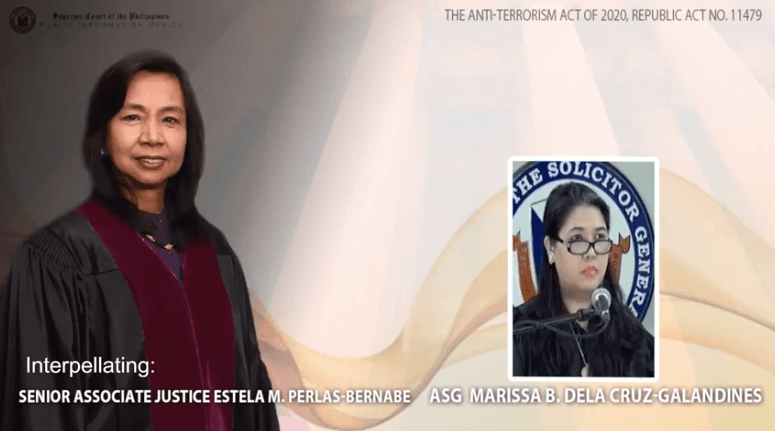SUMMARY
This is AI generated summarization, which may have errors. For context, always refer to the full article.

Day 8 of the Supreme Court oral arguments on the anti-terror law pushed the government lawyers to reveal that the anti-terror council could have the power to order the prolonged detention of a person with suspected association to a terror group, even if that person’s offense is not terrorism.
Senior Associate Justice Estela Perlas-Bernabe called this power “very dangerous.”
Bernabe on Wednesday, May 12, asked a hypothetical question: Cho’s group has been designated as a terror group, and Cho was caught with a comrade carrying unlicensed firearms. But there is no information on the affiliation of the comrade. The comrade was arrested for illegal possession of firearms.
How long can the government detain him?
Assistant Solicitor General (ASG) Marissa dela Cruz-Galandines said only up to 36 hours, as prescribed by the Revised Penal Code on warrantless arrests.
“But your honor, may I just qualify my answer – if the law enforcement agents would be able to secure an authority from the anti-terror council, this comrade may be detained longer than 36 hours,” said Galandines.
The anti-terror council, under the law, can authorize up to 24 days of detention.
Bernabe asked: Why does the anti-terror council have authority over the comrade when the offense is not terrorism but just illegal possession of firearms?
“We submit, your honor, that the fact that he was in possession of illegal firearms and he is with Cho, then the anti-terror council may issue an authority for his continued detention. After all, your honor, this may be necessary to prevent the commission of graver crime of terrorism,” said Galandines.
“But that is very dangerous,” said Bernabe, before the senior justice moved on to another topic.
National Security Adviser Hermogenes Esperon Jr was finally called to Court on Wednesday, where he red-tagged progressives in open court and warned of new terror designations of individuals as early as Thursday, May 13.
Preliminary proscription
Upon Bernabe’s questioning, Galandines also said that a preliminary proscription can already be the basis for prosecution.
Under the law, the anti-terror council has its discretionary power to designate groups and people as terrorists. The government maintains the only consequence of designation is freezing of assets.
Proscription is a distinct court process where a full trial must be conducted to officially declare a group as a terrorist. This can be the basis for prosecution, for example, under Section 10, which punishes membership to a terrorist organization.
But under the law, the court can issue a preliminary order of proscription in as quick as 72 hours without a single hearing. This is one of the most contentious added powers of the anti-terror law.
“We submit that he could be prosecuted because Section 10 is recruitment to and membership in a terrorist organization,” said Galandines.
But when Chief Justice Alexander Gesmundo asked ASG Raymund Rigodon what the basis would be for arresting without warrant a suspected member of a terror group, the government lawyer did not answer preliminary proscription.
Rigodon merely cited surveillance “and intelligence reports, among others.”
“What would trigger law enforcement to conduct surveillance?” Gesmundo pressed.
“If they have assets within that organization who provided them with information, that will serve as basis for surveillance application,” Rigodon answered, as Gesmundo moved on.
The next session is on Monday, May 17. – Rappler.com
Add a comment
How does this make you feel?









There are no comments yet. Add your comment to start the conversation.